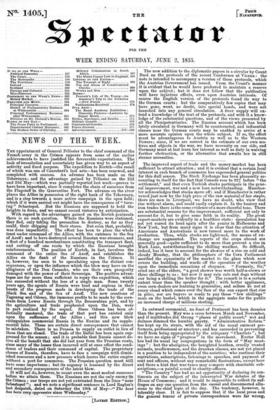NEWS OF THE WEEK.
THE appointment of General Pelissier to the chief command of the French army in the Crimea appears from some of the earlier achievements to have justified the favourable expectations. The look of irresolution and uncertainty has given way to an aspect of activity and fixed purpose. The expedition to Kerteh—the recall of which was one of Canrobert's last acts—has been renewed, and completed with success. Au advance has been made on the Tohernaya; and the advantage gained by Pelissier on the 22d and 23d May—which was partially reported last week—proves to have been important, since it completes the chain of successes from the Flagstaff to the Quarantine Fort. The advance on the river places the Allies in-possession of the right bank of the Tchernaya, and is a step towards a more active campaign in the open field ; whieh if it were carried out might have the consequence of " turn- ing" Sebastopol. But the Russians are supposed to hold the heights in force, and we cannot record victories by anticipation. With regard to the advantages gained on the Kertch peninsula there is no such question. Where the Russians were stationed, they fled, only taking the precaution to destroy, as far as they Could, their shipping and their stores. But even that, probably, was done imperfectly. The effect has been to place the whole tract under command of the Allies, with the entrance to the Sea of Azoff; and to have destroyed several Russian war-steamers, and a fleet of a hundred merchantmen constituting the transport fleet, and cutting off one route by which the Russians brought reinforcements. The position of Kerteh, in fact, involves the command of the entire Sea of Azoff, and establishes the Allies on the flank of the Russians in the Crimea. It is, however, too soon to be speculating upon the distant con- sequences, or upon the influence which the blow may have on the allegiance of the Don Cossacks, who see their own prosperity damaged with the power of their Sovereign. The positive advan- tages are far more than sufficient to repay the expedition, which has succeeded without the loss of a single man. Some twenty years ago, the agents of Russia were loud and copious in their boasts of the progress made in developing the trade of the Black Sea and of the Sea of Azoff. The new creations of Taganrog and Odessa, the immense profits to be made by the corn- trade from Lower Russia through the Bessarabian port, and by the agriculture and trade prophesied upon the Don were in part realized by the sequel. Since Odessa has been ef- fectrially mastered, the trade of that port has existed only upon the sufferance of the Allies ; and this new blow extinguishes commercial Russia in the Euxine and its supple- mental lake. These are certain direct consequences that cannot be mistaken. There is no Prussia to supply an outlet in lieu of those that are closed. The trade of the Baltic has been again sup- pressed for the season ; and it is probable that Russia cannot de- rive all the benefit that she did last year from the Prussian route, since many of the losses then incurred will at once affect the confi- dence of traders and their command of capital. The proprietary classes of Russia, therefore, have to face a campaign with dimin- ished resources and a new pressure which leaves the entire empire without a port for commerce. The Prussian question must still
i have some importance; but its urgency is lessened by the direct and secondary consequences of the latest blow.
It will not do, however, to count even the most modest successes before we attain them. The Russians are not the only enemyffri the Crimea : our troops are not yet extricated from the lines "near Sebastopol"; and we note a significant sentence in Lord Raglan's last despatch, dated on Saturday the 19th of May—" 27w heat has been very oppressive since Wednesday."
The new addition to the diplomatic papers is a circular by Count Buol on the protocols of the recent Conference at Vienna : the note is intended to accompany a version of those protocols, which the Austrian Government has issued. From the Count's manner it is evident that he would have preferred to maintain a reserve upon the subject ; but it does not follow that the publication will have injurious effects, even upon Austrian interests. Of course the English version of the protocols found its way to the German courts ; but the comparatively few copies that may have gone, went, no doubt, into special hands, and were not launched into any general circulation. A freer supply will ex- tend a knowledge of the text of the protocols, and with it a know- ledge of the substantial questions, and of the views presented by all the Plenipotentiaries. The Russian account which has been lately circulated in Germany will be counteracted, and influential classes near the German courts may be enabled to arrive at a more accurate opinion upon the whole subject. If so, the effect must be advantageous to Austria as well as to the Western Powers ; since, if we are correct in the estimate of our own mo- tives and objects in the war, we have necessity on our side, and Germany must at last learn her interest as well as duty in waiving further obstruction, or the alternative that awaits her in still sterner necessities.


























